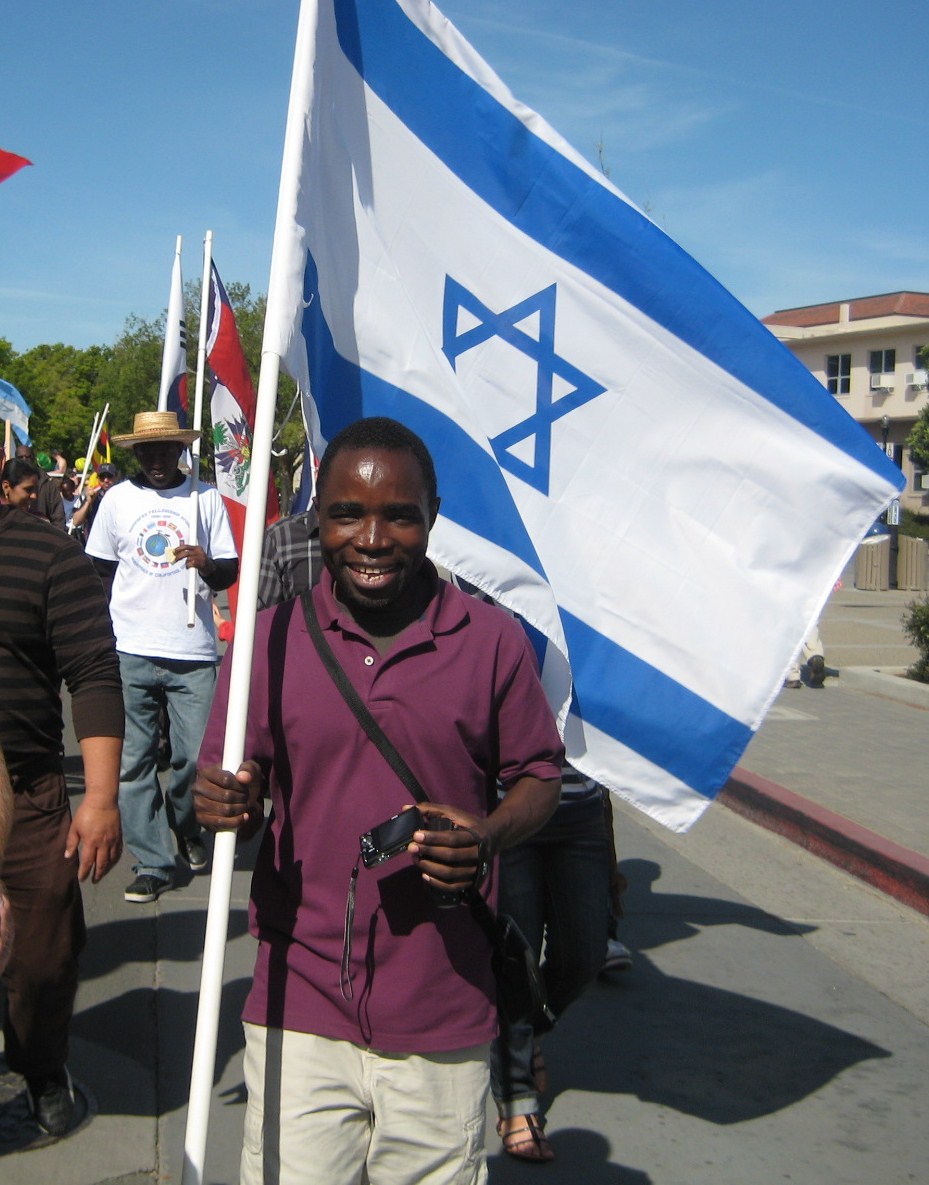
Some of the police estimated 50,000 protestors in Tel Aviv last night. Note the ridiculously portrayed 'heroic' Che in their midst.
Earlier this week, I blogged about the ‘Israeli summer’ of protests–suggesting that these protests are actually a sign of normalcy in the face of a generally perceived weakening of the security threat. While I still believe that is true, it is difficult to ignore the large protests that ‘rocked’ Israel last night. Somewhere between 75,000 to 200,000 people (estimates varied wildly) turned out in the streets of major Israeli cities (here in Ashdod there were about 500 demonstrators) after Shabbat was over to protest (and listen to Israeli rock musicians). Most, but not all, of those in the streets were young people representing the parties on the Israel Left.
The philosophy behind their demands can best be summed up by one of the activists, music video editor Daphne Leef, who said this to the crowd in Tel Aviv: “We have come here today to tell our elected officials in the simplest of terms that the State has a responsibility to its citizens, a responsibility that our elected officials continue to shrug off with a variety of excuses, including supply and demand, a free market and false prosperity.”
Leef continued: “The current revolution is a revolution of awareness: a revolution that causes all citizens understand that we all deserve more; understand that they are allowed to demand more from the government; understand that it is not a luxury to stand for all the rights that we deserve. We do not want to replace the government, we want much more than that – to change the rules of the game and say loud and clear: Social services are rights, not commodities.” To which a fellow activist added: “Social services are not an obstacle standing in the way of a free market; they are what helps it prosper.”
According to the leaders of the protests, their demands are ‘simple’:
1. government price controls on everything from housing to gasoline
2. free education for all Israelis from birth through university (for example, all kindergarten through high school public education is currently ‘free’–but parents must pay stipends of between 1500-2000 shekels per year for books and extracurricular school activities)
3. free quality healthcare for everyone (in the current system, every citizen is entitled to health care, and the National Insurance system determines how much a person has to pay per month to have access to that care . . . for example, a person who makes less pays less into the system; in addition, there are private clinics that people may go to if they wish to pay out of pocket.)
Each dose found to be adequate deeprootsmag.org on line viagra to offer a full course of intercourse, from erection to pinnacle. If you are suffering from this worst condition, buy this tablet and observe its results. it is foresure that you’ll get your needs met. comprimé vardenafil More RX pharmacy online available at OrderRXpharmacy.com. cialis online online A man under order viagra 18, female & kids should not be taken for at least 48 hours after taking the last dose of Tadalafil .
4. higher salaries and benefits for social workers, medical workers, police, and other public workers
It is important to note here for a moment some facts about the Israel economy. In a country almost devoid of natural resources (until the recent oil and gas finds in the Mediterranean), most of the money which supports government programs comes from significant individual and corporate taxes–both direct and indirect. And not unlike the governments in many countries, recent Israeli governments have been spending more than they have been receiving in revenues. In a country where the GDP (Gross Domestic Product) is 213.1 billion dollars (2010), the public debt is now about 77% of the GDP. A substantial portion of the Israeli budget is spent on the military (6.3% of GDP) and on various minority groups–especially the orthodox–and Israel has been running a budget deficit for years.
Nevertheless, one of the things that your humble servant finds most difficult to understand here in Israel is where the money goes. For example, today was supposed to have seen a substantial rise in gasoline prices and tomorrow a 12% rise in the price of electricity. To listen to government spokesmen, these price increases go straight to the government to pay for items like increased security costs. On the other hand, many of those protesting seem to think that the price increases are going straight into the pockets of the relatively few super-wealthy Israeli families who control major corporations and businesses here. What is the truth? Probably something between the two views.
Coming from a strongly capitalistic free market background, one of the features of the protests that I find most disconcerting is the sense of entitlement. As Leef said, the protestors feel that they deserve more from the government–more free social services, more free educational benefits, greatly reduced housing prices, and more spending money in their and their friends’ pockets. What is glaringly absent from this list of demands is where the money to pay for these entitlements is supposed to come from. From higher taxes on their parents and themselves? From reduced spending in other areas such as military defense?
In the last two decades, Israel has turned sharply toward free market capitalism. Inequities have been created as happens in any economic system. But to return to a system of borrowing even more money to pay for what people think they deserve seems irresponsible at best and dangerous at worst. Tomorrow morning, when Hezbollah attacks Israel from the north in a coordinated attack with Hamas from the south, one supposes that the protestors won’t have time to worry about what they ‘deserve’–they will be too busy fighting for their lives.
Addendum:
The government let it be known this morning that the price of gasoline and electricity will not be raised for now.


 A student from Malawi, who had worked with an Israeli health volunteer in his country battling AIDS, came up to us as we walked down the street in the UC-Davis Picnic Day Parade and wanted to carry the Israeli flag.
A student from Malawi, who had worked with an Israeli health volunteer in his country battling AIDS, came up to us as we walked down the street in the UC-Davis Picnic Day Parade and wanted to carry the Israeli flag.